Tidal Change: Love, Hope and Wonder at Sea
Listen to Alaska’s commercial fishers talk about signs of climate change in the places where they live and work.

We all love stories from the sea. Abundance. Hope. Wonder. People who work on Alaska’s fishing boats see it all up close. We wanted to know more about how captains and crews on commercial fishing boats are experiencing signs of change in the places where they live and work, so we sat down to listen. We were impressed with what we heard.
Now, Tidal Change is a podcast. Listen on Apple podcasts, Google podcasts, Podbean and Spotify. Our pilot episode is live and we invite you to listen in on these long-form conversations.
Also, scroll down on this page to hear their stories of changing seas in a set of shorter recordings, available for listening exclusively on this page.
We’re pleased to amplify these voices of experience because they deserve a place in Alaska’s larger conversation about climate change. The Nature Conservancy believes that talking openly about the impacts and opportunities that Alaskans are experiencing as a result of climate change—in the Gulf of Alaska, in Bristol Bay, in Prince William Sound, in Cook Inlet and beyond—will help our state craft the most robust response. It’s key in securing a future in which both people and nature thrive, on land and at sea.
These Tidal Change interviews were recorded in our soundproof studio booth at the Pacific Marine Expo trade show in Seattle, Washington, in November, 2018.
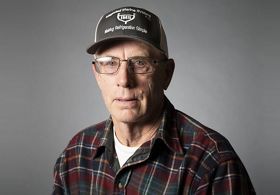
Leonard Leach
The environment’s changing. Undoubtedly.
I'm Leonard Leach, I'm from Ketchikan, Alaska. I have participated in most of the fisheries in Southeast. I've gilnetted, I've trolled, I've fishedcrab, I fish herring. I came to Alaska in '61, right out of high school. Got to Ketchikan, worked on a seine boat, which most young fellows do. And I've fished ever since. At 76 years old, I'm still fishing. I just enjoy being out there. Enjoy the scenery, I don't get tired of looking at the birds, the whales, the water. Everything's changing, it's always a challenge and so it kind ofkeeps you on your toes.
The environment's changing, undoubtedly. When I first fished, there was a lot of ice. Now, you know, most those glaciers are all receded. This summer was the weirdest summer of all. It was sun shiny the entire summer. You know, if this whole warming trend keeps happening, and the ocean starts warming, even a few more degrees. My understanding is jellyfish really come back, they thrive in that warmer water, and that would be really detriment toour gill netting, at least, and seining. I mean, jellyfish are a plague, that youhate.
So I believe if somebody comes up with some of the solutions, and you educate us, we'll do it. When we were young, I dumped my oil overboard. Now I wouldn't dream of it. We never had a garbage can on a boat, we threw all the garbage over the side. Now people go onto beaches and pick up garbage. And that's all from education, I mean who would have thought?
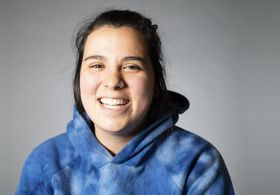
Lia Cook
I truly believe commercial fishing has shaped who I am and what I’m capable of.
My name is Lia SabinaMaria Martinez Cook and I have fished on the fishing vessel The Dead Red for the last eight seasons. So my dad has been fishing all my life. He started with herring and then he moved onto red salmon in Bristol Bay. I work on a family boat that really just like brings us together every year because that's my dad and my brother and I. And I truly believe that fishing has shaped who I am and what I'm capable of. So it's 3:00 AM and you're out fishing and your net needs to be in by 3:10 and you're out there pulling in the net as hard as you can and you are exhausted. That builds character. And I'm just so grateful that I've been able to be a part of it for eight years and just hope to continue to be a part of it through the rest of my life.
Fish and Game does a great job, but there's still a lot of imminent threats to preserving the fishery. Over the last few years. It seems that the run has become later and later and later. A lot of what we've discussed on the boat is that it's because of the warmer weather and the warmer weather affects the water, and so the water is warmer in the fish get confused and they don't know when they're supposed to run. And so it just really affects the peak and the amount of fish that come through, because there is that confusion in the school of when are we supposed to go and spawn and do all these things.
Even the saltiest of captains and seamen are just like: climate change, it's happening. It is relevant and it's a conversation that needs to happen.
I hope it can be understood that the environmental impacts that we're having need to be changed in order to preserve that great practice that we're all so privileged to have a part of.
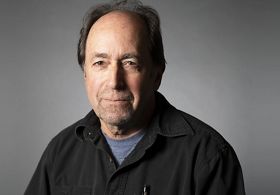
Bob Eder
Climate change is my single biggest concern relative to the ocean environment and to the industry that I participate in.
My name is Bob Eder, I'm a career commercial fisherman working out of Newport Oregon. I kind of stumbled into commercial fishing as a 21 year old. Actually I was doing some writing at the time. I found plenty of things to write about but after a second summer working on a salmon troller I got the notion that I wanted to try to do it myself. I was able to buy a boat and go fishing and I likehard work. There's no bulls*** in commercial fishing. The writing tapered off but the fishing, I jumped in with both feet and both arms and I fished for 45 years.
Climate change is my single biggest concern relative to the ocean environment and to the industry that I participate in. I'm a Dungeness crabber so we've already seen effects in that fishery. Warm water produces more algae bloom, harmful algae blooms. It's not something that's coming, it's something that we have been experiencing. And in our industry there are people of all different political leanings but I don't think I know any fishermen that don't recognize climate change and the challenges coming. A lot of it just boils down to, "Are you worried?" "Yes," "Are you worried?" "Yes." Because we are experiencing it.
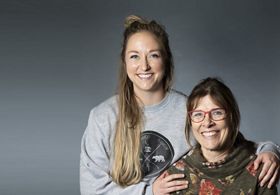
Lauri and Sonja Rootvik
There's something very special about fishing. It's in my blood, it's my home.
Lauri Rootvik: My name is Lauri Rootvik and I'm from Dillingham, Alaska. This is my youngest of four daughters.
Sonja Rootvik: My name is Sonja Rootvik, and I fish in the summers in Bristol Bay, Alaska.
Lauri Rootvik: There's something very special about fishing. It's in my blood, it's my home.
Sonja Rootvik: I'm curious how it's been for you, being a woman in the commercial fishing industry, has it been difficult at all or-
Lauri Rootvik: Since I had four daughters, they became my fishing crew. And we are strong and capable women that are equal to anything that comes on that fishing ground.
Sonja Rootvik: I am wondering about the run of fish, how that has changed over the years.
Lauri Rootvik: Back when I was a child, it was the Fourth of July run, and it was pretty predictable, and it seems that it's not predictably the Fourth of July anymore. It hasn't been for quite a few years.
Sonja Rootvik: Do you see yourself fishing for the rest of your life?
Lauri Rootvik: My mom had terminal cancer and her dying wish was just to get to the fishing grounds and be surrounded with her family, so I'll probably be like her. So what is it that draws you back to fishing in the summertime?
Sonja Rootvik: I kind of feel like a salmon, like every year I just return back to Bristol Bay and I'm like ready to go back.
Lauri Rootvik: That's my girl.
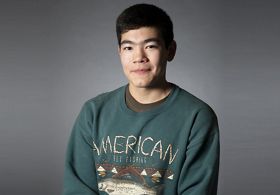
Triston Chaney
Everybody's saying this year in particular, "Man, those fish are so small this year."
My name is Triston Cheney, I'm 19 years old. So I participate in the drift gillnet fishery in Nushugak Bay. I've been fishing there for 10 years now with my grandpa. It's a good source of money, especially if you have a good captain, which my grandpa is. I'm deck boss, my grandpa's captain, I got a younger brother ... two younger brothers and my first cousin on there. Even if we do hate each other at times, you know we're family so it's just like stick together.
But everybody saying this year in particular, "Man, those fish are so small this year." You know we were moving from 5 1/8" gear to 4 3/4, 4 1/2, just to get more poundage each day. I haven't looked into climate change a lot, but, I mean, ice is melting I know that. Earth's warming, that's why I try to focus on the problems that I could work on more, like, you know, Pebble Mine. They want to try and develop a mine at the headwaters of a river, that'd be bad news.
But, yeah, after my grandpa stops fishing, I'm going to take over the boat. It's definitely going to be different without him. I mean, he's been fishing in the bay since he was 10. I think he said he got his first boat when he was 14, so he knows so much about the fishery, and I just love fishing with him because he knows so much. I mean, I could fish with him for a hundred more years and still be learning.
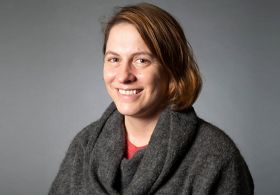
Frances Leach
I want salmon to be around for generations and we're in control of that as humans. It's all on us.
My name is Frances Leach. I grew up commercial fishing in Alaska. At 11 years old, one of our deckhands didn't show up, and that's when my dad told me that I would be operating the winch, which scared a lot of people, but when they'd see my dad run the winch, they would ask if I could do it instead. So, I gained some street credit for operating the winch at such a young age. I worked for the Board of Fish for a number of years, so that really gave me the taste for getting more involved in fisheries politics and advocacy.
I'm 42 years old, and so I would almost say I've been in the industry for 42 years because I started pretty much immediately. I think the first time I really noticed change was in the '90s when we used to draw water for our saltwater refrigeration, and you have to chill it down to 32 degrees. We would draw water and it was already 62 or 63 degrees, and that was, that's a little scary. You don't expect the water to be that warm, and so I think that was definitely the first time I realized that something was happening.
We used to just talk about fish prices or the bad fishing or good fishing, whatever. Now, the salty old fisherman who has just always gone out there and slayed fish, they're starting to really recognize that things are changing, and that if we don't start to do something about it, we're going to have a serious problem on our hands.
I'll admit I'm scared. The salmon have been disappearing all over our world and within our lifetime, but I still have faith in humans that we can turn things around.
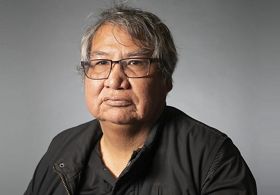
David Sohappy
In our belief, if the Indians don't take care of and worship the salmon, the salmon will disappear.
My name is David Sohappy, I'm a Yakama Nation Indian. I'm a traditional fisherman, I catch fish for the Longhouse, our church, and we're told by the Creator to honor that fish. We take it to the long house, share it, sing songs over it. It's a great honor, I believe, to even catch fish. I've been fishing the Columbia River since age five, 55 years I've fishing. A lot of things have changed, we don't get any big fish anymore, it's really sad.
I've heard people that say, "We're never going to get that fish back." Which is true, I haven't seen any fish that big to this day. I notice climate change, the river's been getting warmer. One year was so warm the blueback ... they just died, died where they were from the warm water. It's scary for my grandchildren who's going to be fishing on the river, if there's any fish left. In our belief, if the Indians don't take care of and worship the salmon, the salmon will disappear.
But I'm still carrying on, trying to, and teach the young kids the Indian way, the Native way. As long as they practice a little bit of it, I think they'll be okay. Hopefully fish will be here for generations to come.
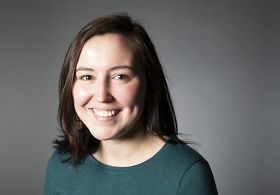
Katrina Leary
This is what it's all about. This is such a generational thing and it's so beautiful.
My name is Katrina Leary. I grew up on the Kuskokwim River. As soon as school got out my parents said, "Okay, we're packing up the boat and we're leaving." We would boat up to Napaimiut. It was founded by my great great grandpa. He started it as a homestead as a trapping place, and my parents kind of have made a point for us to go back and live there every summer.
As kids we always had this competition, who could get the most birch bark for the smokehouse. We'd cut it up and clean the smoke house and get everything prepared. My dad built this fish rack that we use every summer to catch fish. He puts it in the river. My dad is always puffing on his cigar and he has his hot cup of coffee, the whole thermos out there. Sitting there sipping coffee with him and he tells stories. It's pretty magical.
My sisters are starting to have kids, and so there's my parents as grandparents, there's us kids, and now we have the grand babies and we're all hanging out around the smokehouse. This is what it's all about. This is such a generational thing and it's so beautiful.
I feel like climate is playing a big role as far as weather and warmth. King salmon are returning back to our rivers younger, and they're not surviving in the numbers that they used to. It's just really emotional. Like, I just ... I don't know. When you realize that your livelihood is being threatened and my kids might not be able to do this ... Fishing really is our life and I couldn't imagine a summer without fishing. I couldn't, and I hope I don't ever have to.
These Tidal Change interviews were recorded in our soundproof studio booth at the Pacific Marine Expo trade show in Seattle, Washington, in November, 2016.
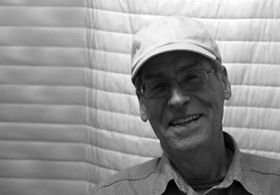
Larry Vander Lind
The abundance of Alaska—of the salmon—is unbelievable.
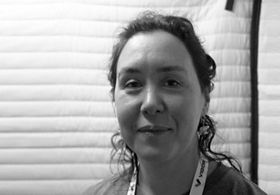
Melanie Brown
I feel like I’m living a legacy. It’s this continuation of a river flowing in time…and I want that to continue for my children.
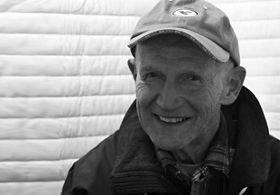
Bob Snell
The planet has provided me with a rich and healthy life and I’d like others to have that opportunity to benefit.
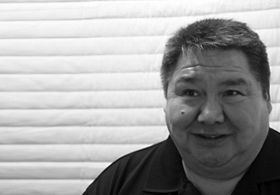
Peter Andrew
I’ve seen the water temperature go up and it scares me.
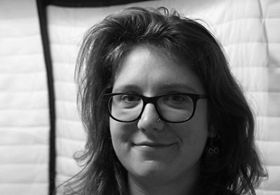
Adrienne Wilber
The fishermen that I grew up most respecting consider themselves stewards of their industry.
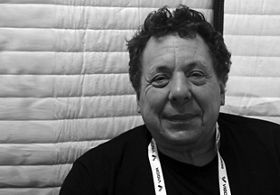
Eugene Anderson
Most fishermen agree that something’s not right.
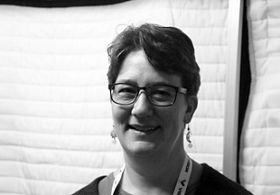
Sharry Miller
When it comes to global climate change, we all need to be more informed, period.
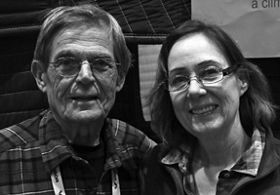
Jon and Brenda Gaedke
It’s real difficult for young people to get into the business.

